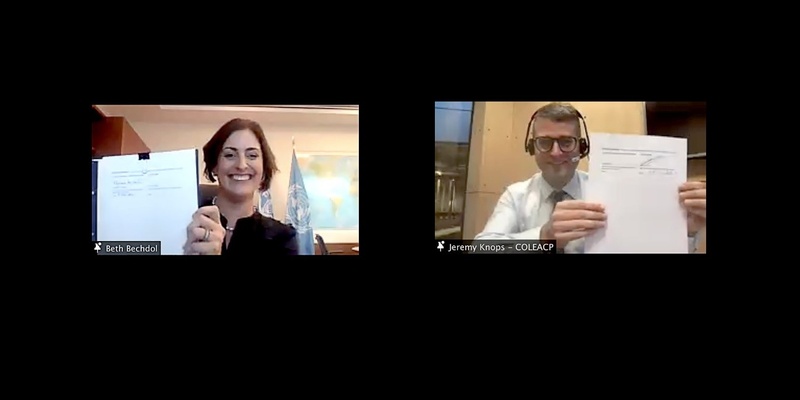IPPC forges partnership with COLEACP to improve food security
Posted on Thu, 25 Nov 2021, 09:03

Credit: FAO
Rome, 19 November 2021. The Food and Agriculture Organization of the United Nations (FAO), on behalf of the International Plant Protection Convention (IPPC) has joined forces with the Comité de Liaison Europe-Afrique-Caraïbe-Pacifique (COLEACP) to improve global food security and sustainable agricultural production. The new partnership intends to achieve this by protecting the environment from the impacts of plant pests and facilitating safe trade, development and economic growth.
COLEACP, a non-profit organization dedicated to developing inclusive, sustainable trade in fruit, vegetables and food products, works through a network of companies, professional organizations and experts to strengthen the agri-food sector in 50 African, Caribbean and Pacific (ACP) countries.
With an estimated 40 percent of food crops lost annually due to plant pests and diseases, guaranteeing plant health can contribute to ending hunger and boosting economic development. FAO and COLEACP intends to work together to improve plant health at both national and global levels, working directly with ACP countries to prevent introduction and spread of plant pests. Both parties will jointly develop a suite of advocacy and educational materials, including e-learning courses designed for phytosanitary practitioners anywhere in the world.
“Plant health is essential for environmental, animal and human health,” said FAO Deputy Director-General, Beth Bechdol during the event. “We look forward to working with COLEACP on strengthening phytosanitary systems and to support our aspirations of better production, better nutrition, better environment and a better life." Bechdol signed the partnership agreement on behalf of FAO and IPPC during the webinar launch attended by 343 participants from around the world. She also presented the general framework of the International Year of Plant Health, which was led by FAO and the IPPC Secretariat, and concluded in July 2021.
“We are very enthusiastic and committed to this partnership with the IPPC Secretariat,” said Jeremy Knops, COLEACP General Delegate. “We are already seeing the fruits of our collaboration through the joint development of new distance-learning tools, as well our contribution to working groups and the translation of selected IPPC guides”.
“From the perspective of COLEACP, this partnership strengthens and up-scales the impact of our EU/OACPS-funded Fit for Market Sanitary and Phytosanitary Programme. This enables us to have a wider outreach among ACP countries and beyond, while at the same time ensuring that our new training offer is recognized to be fully aligned with the internationally agreed norms,” Knops added.
At the webinar, the CONNECT portal webpage was launched to increase private sector engagement. E-learning courses under the IPPC-COLEACP collaboration were also demonstrated, raising interest among participants. The IPPC and COLEACP have successfully collaborated in the past by conducting and financing Phytosanitary Capacity Evaluations (PCE) in Sierra Leone, inviting and funding representatives of 15 ACP countries in Commission on Phytosanitary Measure meetings, and translating nine IPPC guides into French.
Learn more

